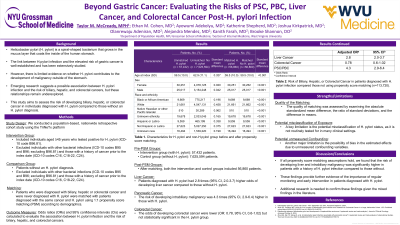Monday Poster Session
Category: Stomach
P3328 - Beyond Gastric Cancer: Evaluating the Risks of Biliary, Hepatic, and Colorectal Cancer Post-H. pylori Infection
Monday, October 28, 2024
10:30 AM - 4:00 PM ET
Location: Exhibit Hall E

Has Audio

Taylor M. McCready, MPH
NYU Grossman School of Medicine
New York, NY
Presenting Author(s)
Taylor M.. McCready, MPH1, Ethan M.. Cohen, MD2, Ayowumi A.. Adekolu, MD2, Katherine Shephard, MD2, Joshua Kirkpatrick, MD2, Olanrewaju Adeniran, MD2, Alejandra Mendez, MD2, Kanith Farah, MD2, Brooke Shannon, DO3
1NYU Grossman School of Medicine, New York, NY; 2West Virginia University, Morgantown, WV; 3West Virginia University School of Medicine, Morgantown, WV
Introduction: While the increased risk of gastric cancer among individuals with a history of Helicobacter pylori (H. pylori) infection is well-characterized, there is limited evidence on its impact on the risk of other malignancies. This study aims to evaluate the risk of developing biliary, hepatic, or colorectal cancer among those diagnosed with H. pylori compared to those who were not.
Methods: We conducted a population-based retrospective cohort study using the TriNetX platform. The intervention group included individuals aged ≥45 years old who tested positive for H. pylori (ICD-10 code B96.81; excluding B95 and all other B96 codes) between January 1, 2000, and May 6, 2024. A comparison group of patients without an H. pylori diagnosis was created using 1:1 propensity score matching (PSM) based on demographic characteristics. Patients were excluded if they had a history of cancer prior to the index date or other disease-causing bacterial infections (ICD-10 codes B95 and B96; excluding B96.81). All comparisons were adjusted for baseline confounders using a 1:1 PSM. Odds ratios and 95% confidence intervals were calculated.
Results: Before PSM, the intervention group with H. pylori comprised 57,432 patients, while the control group without H. pylori included 7,625,594 patients. After matching, each group included 56,860 people. If all PSM assumptions hold, the odds of developing liver cancer in those diagnosed with H. pylori was 2.8 times the odds of developing liver cancer among those without H. pylori (OR 2.8; 95% CI, 2.0-3.7). The risk of intrabiliary malignancy was also higher (OR 4.3; 95% CI 2.9-6.4), and the risk of colorectal cancer showed a lower but not statistically significant difference (OR 0.78; 95% CI 0.6-1.02).
Discussion: This nationwide cohort study found that the risk of developing liver and biliary malignancy was significantly higher in patients previously diagnosed with H. pylori compared to those who were not. These findings highlight the importance of regular monitoring and early intervention in patients diagnosed with H. pylori to mitigate the increased risks of severe conditions such as biliary, liver, and colorectal cancer. Further research is needed to understand the underlying mechanisms driving these associations.
Note: The table for this abstract can be viewed in the ePoster Gallery section of the ACG 2024 ePoster Site or in The American Journal of Gastroenterology's abstract supplement issue, both of which will be available starting October 27, 2024.
Disclosures:
Taylor M.. McCready, MPH1, Ethan M.. Cohen, MD2, Ayowumi A.. Adekolu, MD2, Katherine Shephard, MD2, Joshua Kirkpatrick, MD2, Olanrewaju Adeniran, MD2, Alejandra Mendez, MD2, Kanith Farah, MD2, Brooke Shannon, DO3. P3328 - Beyond Gastric Cancer: Evaluating the Risks of Biliary, Hepatic, and Colorectal Cancer Post-<i>H. pylori</i> Infection, ACG 2024 Annual Scientific Meeting Abstracts. Philadelphia, PA: American College of Gastroenterology.
1NYU Grossman School of Medicine, New York, NY; 2West Virginia University, Morgantown, WV; 3West Virginia University School of Medicine, Morgantown, WV
Introduction: While the increased risk of gastric cancer among individuals with a history of Helicobacter pylori (H. pylori) infection is well-characterized, there is limited evidence on its impact on the risk of other malignancies. This study aims to evaluate the risk of developing biliary, hepatic, or colorectal cancer among those diagnosed with H. pylori compared to those who were not.
Methods: We conducted a population-based retrospective cohort study using the TriNetX platform. The intervention group included individuals aged ≥45 years old who tested positive for H. pylori (ICD-10 code B96.81; excluding B95 and all other B96 codes) between January 1, 2000, and May 6, 2024. A comparison group of patients without an H. pylori diagnosis was created using 1:1 propensity score matching (PSM) based on demographic characteristics. Patients were excluded if they had a history of cancer prior to the index date or other disease-causing bacterial infections (ICD-10 codes B95 and B96; excluding B96.81). All comparisons were adjusted for baseline confounders using a 1:1 PSM. Odds ratios and 95% confidence intervals were calculated.
Results: Before PSM, the intervention group with H. pylori comprised 57,432 patients, while the control group without H. pylori included 7,625,594 patients. After matching, each group included 56,860 people. If all PSM assumptions hold, the odds of developing liver cancer in those diagnosed with H. pylori was 2.8 times the odds of developing liver cancer among those without H. pylori (OR 2.8; 95% CI, 2.0-3.7). The risk of intrabiliary malignancy was also higher (OR 4.3; 95% CI 2.9-6.4), and the risk of colorectal cancer showed a lower but not statistically significant difference (OR 0.78; 95% CI 0.6-1.02).
Discussion: This nationwide cohort study found that the risk of developing liver and biliary malignancy was significantly higher in patients previously diagnosed with H. pylori compared to those who were not. These findings highlight the importance of regular monitoring and early intervention in patients diagnosed with H. pylori to mitigate the increased risks of severe conditions such as biliary, liver, and colorectal cancer. Further research is needed to understand the underlying mechanisms driving these associations.
Note: The table for this abstract can be viewed in the ePoster Gallery section of the ACG 2024 ePoster Site or in The American Journal of Gastroenterology's abstract supplement issue, both of which will be available starting October 27, 2024.
Disclosures:
Taylor McCready indicated no relevant financial relationships.
Ethan Cohen indicated no relevant financial relationships.
Ayowumi Adekolu indicated no relevant financial relationships.
Katherine Shephard indicated no relevant financial relationships.
Joshua Kirkpatrick indicated no relevant financial relationships.
Olanrewaju Adeniran indicated no relevant financial relationships.
Alejandra Mendez indicated no relevant financial relationships.
Kanith Farah indicated no relevant financial relationships.
Brooke Shannon indicated no relevant financial relationships.
Taylor M.. McCready, MPH1, Ethan M.. Cohen, MD2, Ayowumi A.. Adekolu, MD2, Katherine Shephard, MD2, Joshua Kirkpatrick, MD2, Olanrewaju Adeniran, MD2, Alejandra Mendez, MD2, Kanith Farah, MD2, Brooke Shannon, DO3. P3328 - Beyond Gastric Cancer: Evaluating the Risks of Biliary, Hepatic, and Colorectal Cancer Post-<i>H. pylori</i> Infection, ACG 2024 Annual Scientific Meeting Abstracts. Philadelphia, PA: American College of Gastroenterology.
